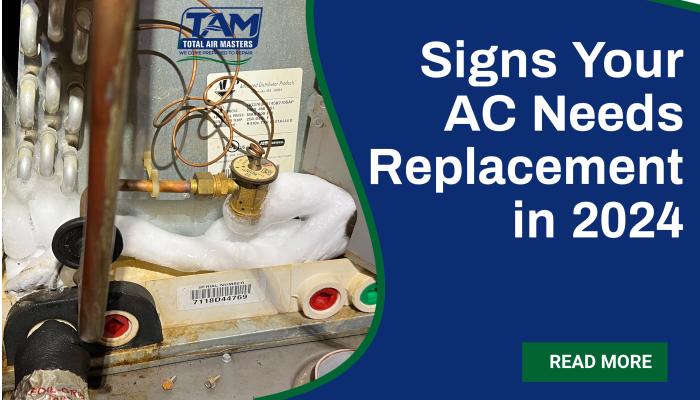
As we move through the year 2024, it’s important to keep an eye on the performance of your air conditioning system. An efficient AC unit is essential for maintaining a comfortable environment in your home, especially during the hot summer months. However, like all appliances, air conditioners have a limited lifespan and may eventually need to be replaced.
Recognizing the signs that your AC unit is nearing the end of its life is crucial. Ignoring these signs can lead to higher energy bills, frequent repairs, and inconsistent temperatures in your home. By identifying when it’s time for a replacement, you can avoid the inconvenience of unexpected breakdowns and ensure your home remains cool and comfortable.
In this article, we will discuss several key indicators that suggest your AC might need to be replaced. Understanding these signs will help you make an informed decision about when to invest in a new system, ensuring optimal performance and efficiency for years to come.
Frequent Breakdowns and Repairs
One of the most obvious signs your AC needs replacement is frequent breakdowns. If you find yourself calling for repairs more often than usual, it might be time to consider a new unit. Air conditioners should not require constant attention to function correctly. A well-maintained AC unit should operate smoothly without frequent disruptions.
Repeated repairs can also add up in costs. You might think you’re saving money by fixing problems as they arise, but these expenses can quickly surpass the cost of a new system. It’s more economical and less stressful to invest in a new AC unit than to keep pouring money into an old one that keeps failing.
Also, think about the inconvenience of having your AC break down during peak summer months. Frequent malfunctions can disrupt your comfort and leave you sweltering in the heat. Replacing an old, unreliable unit with a new, efficient model ensures consistent cooling and peace of mind.
Rising Energy Bills
Another indicator that your AC may need replacing is a noticeable increase in your energy bills. Older units tend to be less efficient, which means they use more electricity to cool your home. If you see a steady climb in your utility bills without a significant change in usage, your AC’s efficiency might be declining.
High energy bills are not just a financial burden; they also signal that your air conditioner is working harder than necessary. This extra effort can strain the system, leading to more frequent breakdowns and a shorter lifespan. Modern AC units are designed to be more energy-efficient, helping you save money on your monthly bills while also reducing your carbon footprint.
Monitoring your energy bills can provide valuable insights. If the cost of cooling your home is rising each year, it might be time to consider upgrading to a new, more efficient air conditioning system. This upgrade can offer better performance, lower energy consumption, and increased comfort in your home.
Inconsistent Temperatures
When your air conditioner struggles to maintain consistent temperatures throughout your home, it’s a sign that it may need replacing. Hot and cold spots in different rooms indicate that your unit is not distributing air evenly. This can lead to discomfort and frustration, as some areas may feel too warm while others are too cool.
An inefficient AC can have difficulty keeping up with the demands of your household, especially during extreme weather conditions. This inconsistency often points to underlying issues such as worn-out components or an undersized unit. These problems can be addressed temporarily with repairs, but a permanent solution might involve replacing the system altogether.
Another factor to consider is the thermostat. Sometimes, inconsistent temperatures are due to an outdated or malfunctioning thermostat. If replacing the thermostat doesn’t resolve the issue, it’s likely time to consider a new air conditioning system that can better handle your home’s cooling needs. A new AC unit can provide better airflow and more reliable temperature control.
Age of the Unit and Technological Advancements
The age of your air conditioner is a major factor in determining if it needs replacement. Most AC units last about 10-15 years. If your unit is approaching or has surpassed this age range, it’s likely time to start considering a new system. Older units tend to become less efficient and more prone to breakdowns as they age.
Technological advancements have greatly improved the efficiency and performance of newer air conditioning systems. Modern units come with features like smart thermostats, variable-speed compressors, and better energy efficiency ratings. These advancements help provide more consistent cooling, lower energy bills, and improved comfort in your home.
Investing in a newer model can also offer environmental benefits. Today’s air conditioners are designed to be more eco-friendly, with refrigerants that have a lower impact on the environment. Upgrading to a new system can help reduce your carbon footprint while keeping your home cool and comfortable. If your AC unit is old and struggling, replacing it with a modern, efficient model is a smart decision.
Conclusion
Replacing your air conditioner can seem like a big decision, but it’s important for maintaining a comfortable and efficient home. Frequent breakdowns, rising energy bills, inconsistent temperatures, and the age of your unit are clear signs that it may be time for a new system. Understanding these indicators helps you make an informed choice and avoid the inconvenience of unexpected failures.
At Total Air Masters, we’re here to help you with all AC replacements in Katy, TX. Don’t wait until your unit stops working completely. Contact us today to ensure your home stays cool and comfortable throughout the year!
